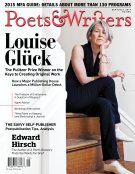This fall the biannual journal Poet Lore, published by the nonprofit Writer’s Center in Bethesda, Maryland, is celebrating 125 years of continuous publication. Coinciding with this month’s release of the anniversary issue, the year’s commemorative events will culminate in a celebration on September 15 at Washington, D.C.’s Folger Shakespeare Library—an appropriate venue for a magazine founded in 1889 by Shakespeare scholars Charlotte Porter and Helen Clarke.
A spirit of editorial openness defines Poet Lore. With no first readers to act as gatekeepers, editors Jody Bolz and E. Ethelbert Miller read every one of the approximately one thousand poems submitted each month. “In other publications where you have a lot of layers of authority,” Bolz says, “things get tossed out because they don’t have a stamped self-addressed envelope, or because they’re handwritten on lined paper and sent from a prison.” Poet Lore subscribes to no such restrictions, and as a result an impressive number of renowned poets whose work might otherwise have been overlooked have launched their careers in the journal’s pages. “We were the first to publish Reginald Dwayne Betts, who’s now a highly regarded poet and memoirist,” Bolz says. “He was in prison when he sent us work.” Carl Phillips, Terrance Hayes, and Natasha Trethewey also received vital early exposure from Poet Lore.
Bolz and Miller have been editing Poet Lore together for twelve years, a labor-intensive collaboration that involves reading, discussion, and sometimes disagreement. “As poets we’re very different,” Bolz says, noting that over the years each editor’s tastes have become more familiar to the other. Bolz can often guess how Miller will respond to a submission, and they will often agree on a poet but not the poem. “We usually have to argue about which poem to take.”
As long-established writers themselves, Miller and Bolz—both of whom have also taught creative writing—are wary of trying to follow poetic fashion. “So many things that were once cutting edge are now passé,” Bolz says. And as readers who see such a high volume of work, the editors are privy to the impact that certain poets, teachers, and schools can have on the work of emerging writers: “People are very influenced by certain American poets and try to mimic their work.” Instead, Bolz looks for work that, for whatever reason, lingers in her memory: “I’ll read something once, then I’ll find myself reading it again, and then I’ll think about it, and go back to it—and that makes me feel it’s a poem I really want to consider for publication. I stop being an editor and become a reader again.”
In its early days, when Walt Whitman was counted as one of the journal’s subscribers and Harriet Monroe was publishing work in its pages (before founding Poetry magazine), Poet Lore was a pioneer in its promotion of both original poetry and poems in translation. Reading back through the magazine’s early issues, Bolz “lost count of the number of languages” that the early editors published, including Native American, African, and Asian languages, as well as Old Norse and Yiddish, among others. Today, while Bolz and Miller are wary of publishing work translated from languages they don’t know, their compromise is an annual portfolio, “World Poets in Translation,” in which an established translator presents a substantial selection of work by a single poet (most recently the late U Tin Moe of Myanmar, whose work appeared in the Spring/Summer issue). The journal is also open to longer-form original work, which poets often have trouble placing; the Spring/Summer issue also included long sequences by Martha Collins and by Christopher Pressfield, who has been in jail for thirty-eight years.
While contemporary literary journals—many of which publish multiple genres—tend to come and go, Bolz believes that one of the reasons Poet Lore has been so successful for so long is its singular focus. “Poetry is a slow form,” she says. “The more time you spend with it, the more you receive from it.” With that combination of focus and openness, the editors are confident that Poet Lore will continue to find new readers in the years to come. “What we feel proud of is that there are a lot of different kinds of poems in the magazine,” Bolz says. “We’re not choosing poems that conform to our aesthetic. We’re interested in the best poems we can find.”
Joanna Scutts is a writer and critic in Queens, New York. She is on the board of the National Book Critics Circle and reviews nonfiction and literary fiction for several publications, including the Washington Post, the Nation, and the Wall Street Journal. Her website is joannascutts.com.










Comments
M. Sakran replied on Permalink
Poems
It's nice to think that every poem gets considered.